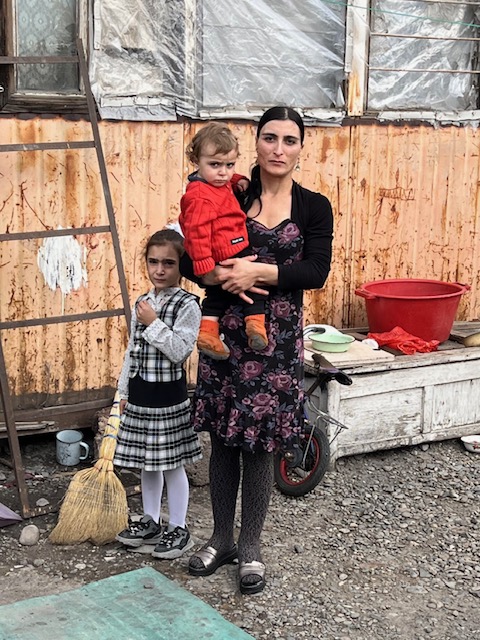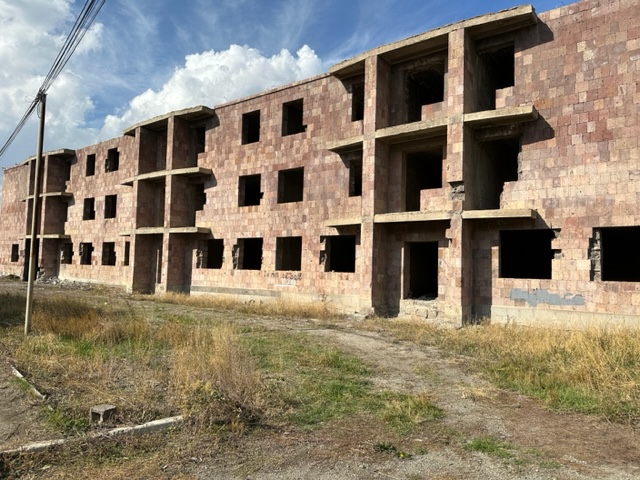
With the memories of the tragedy still fresh in our minds, it is difficult to believe it has been 34 years since time was frozen on that early winter day in Armenia. Much has changed in our world since those dark days. Armenia and Artsakh were not yet independent states as the Soviet Union was in its final moments. The inspiring Karabakh liberation movement was in its early stages. Gyumri and Spitak, where the devastation was immense, today reflect significant signs of recovery. The town square of Gyumri is vibrant and lined with quaint shops. The main churches in the town center have been rebuilt as a symbol of our resilience. The blossoming IT industry is evident in the city as it enables viable professional options. New apartment complexes dot the landscape as the community attempts to leave the horrific losses to history, but stark reminders continue to haunt the leadership, residents and visitors. These reminders are called “domiks,” a Russian term meaning “little houses.” The earthquake occurred during the early days of winter in 1988. Bulk humanitarian aid began arriving in containers to assist in the short-term recovery efforts. With thousands left homeless, the empty metal shipping containers were the only plausible housing alternative for a community overwhelmed with the devastation. They are simply crude metal structures with no electrical wiring, plumbing or insulation, but they were the only option for those desperate for shelter. Originally, there were several thousands populating the empty lots of Gyumri and the surrounding communities. Over the last 30 years, the numbers have been reduced significantly, but there are still over 2,000 domiks in use. They exist on public land behind commercial buildings or in parks. Others exist in undesired areas such as abandoned factories from a bygone era. Essentially, these families, our brethren, live as squatters tolerated by the authorities because the alternative would be a homeless population. Efforts to reduce this tragedy are in place, but it is a slow journey. The domiks exist as a symbol of our national failure after 30 years.

During our recent visit to the homeland, we wanted to take a day to visit Gyumri and become acquainted with the current situation. We were most fortunate to connect with our good friend, Peter Abajian, executive director of the Paros Foundation. Paros has been on the ground in Gyumri for years, focusing on humanitarian, child care, housing and economic projects. The impact of their work is significant. Paros frequently delivers food items to the domik residents as a dignified way of understanding their status. On this day, Peter and his team of young professional interns from the diaspora visited 12 domiks delivering essentials and conversing with the families. The conditions that these folks live under can only be described as horrific. The metal containers have aged in 30 years with physical decay. Families with children live in these units, which are no bigger than a small box truck. They add a crude stove for cooking and heating. We were amazed at how gracious these people were as they invited us into their home. It would break the heart of the most callous to see young children living in these conditions. Many of the families are young and a product of a cycle of generational poverty that the domiks represent. It is similar to the endless cycle of Americans living in dangerous and poverty-stricken projects for multiple generations.

Organizations like Paros work diligently to support these people while the painful process of eliminating domiks continues. Focusing on the needs of the children, Paros founded “Debi Arach” (moving forward) as an after school program that is frequented by many “domik kids” to provide them hot meals, subject specific tutoring and a safe peer environment. Their dignity is restored with individual lockers where they have a change of clothing and other personal articles. From the exterior, it looks like another store front in a short strip mall, but inside is where the magic of saving childhoods is happening. It is a privilege to be in such an environment where selfless dedication is abundant. During our visit, we saw smiling faces of children who are not forgotten. Paros recently completed an agreement with the municipal government to acquire an abandoned but structurally sound three-story building in an even poorer section of town. In one year, they expect to completely renovate the building into a first floor operation that will include a second Debi Arach. The second and third floors will become 18 apartments for those currently in domiks. The work continues to erase this sad chapter. These are life-changing events for one family at a time. It is too easy to become critical or frustrated with the shocking discovery by visitors that these container homes still exist. The non-profits in partnership with a revived local government are doing something to make a difference.
The tragic earthquake on December 7, 1988 is much more than another painful historical milestone. It triggered a cycle of poverty and despair that we have yet to recover from 34 years later. When the earthquake occurred followed by the remarkable collapse of the Soviet system, families went from employed to poverty stricken. They went from homes to homeless. There was nothing to go back to, and the process of rebuilding has been impacted by corruption, economics and resources. Gyumri is a city with two stories to share. It certainly has the legacy of the earthquake and its social impact. This city, the second largest in Armenia, is also experiencing a revival. The urban area is inviting with unique architecture. The presence of software businesses is very visible and creates as Peter says, “instant middle class.” Paros started another unique operation—a beauty salon. The first floor is a for-profit salon open to the public. The second floor is a training area for new stylists. On the day of our visit, about a dozen women had completed their training and were receiving their certificates. The excitement on their faces was all about hope and opportunity. The first floor profits fund the training center. It is an innovative business model that is making a difference in the lives of many. We also learned of an ambitious public/private partnership to build a new business/social neighborhood that will meet the needs of an expanding young professional demographic. Many of the educated youth are learning they don’t have to live in Yerevan for personal success. Creative projects emerge when hope is restored.
Despite the growing examples of success and a prosperous future, the legacy of poverty remains. It is estimated that up to 30 percent of Armenia’s population meets the definition of poverty. We must constantly remind ourselves that the face of poverty is not simply defined through a lack of financial resources. Chronic poverty impacts the future of the children caught in this dilemma. Will they succeed in receiving an education? What is the long-term impact of being under-nourished? After years of lost dignity and hopelessness, depression and other forms of mental illness plague the family stability. Thankfully, organizations from Shirak Marz and other areas of Armenia and the diaspora are working tirelessly to address the needs of these families. These quiet heroes inspire our confidence in humanity. It can be overwhelming when we leave the comfort of our lives and experience the despair of others. The vast majority of these residents are proud people who simply want the opportunity to improve their lives. Investing in their future is not charity. It is enabling the opportunity to fulfill their potential. When we entered the home of one of the families trapped in the domik life, they were not seeking pity. It was almost as if they understood that by opening their home to us that others would become aware of this problem and be inspired to act. After our day in Gyumri, I understood that moving families into apartment life takes time, given the fact that the demand is greater than the supply for those in need. I also became acutely aware that there is immediate assistance relative to the education and social needs of their children, while restoring some level of dignity in their lives. Once despair is replaced with dignity, hope returns. This is a great gift that each of us are capable of creating.
Once despair is replaced with dignity, hope returns.
As I wandered through the various rooms of the Debi Arach Center, I began to imagine how many of these children’s lives have been changed with the patriotic work of others. In its simplest and perhaps most relevant definition, patriotic acts are inspired by one’s love of the nation. These children are an important part of the nation. The work is challenging; there are setbacks. Progress is always too slow, but success is so rewarding. Every parent wants a better life for their children. This is our hope in our comfortable lives in America, and it is the hope of parents struggling in Armenia. As the parents deal with the frustration and limitations of domik life, how wonderful that many of their children are able be with other students in a safe, nurturing environment that focuses on them and their well-being. For these parents who expect little for themselves except the ability to provide for their families, it is gratifying to know that their children are not forgotten. One day, I believe we will be reading stories of children who began their lives growing up ever so modestly in shipping containers and became sterling examples for a prosperous Armenia. We can all accelerate that vision by lending our time, talent and treasure to making domiks history.



Today is also a tragic anniversary from that decade. Forty-two years ago today, John Lennon was murdered outside his apartment building. No one could make sense of it then, no one can make sense of it now; it will never make sense.
I like to think that, had Lennon lived longer, he would’ve drawn attention to the Armenian Genocide.